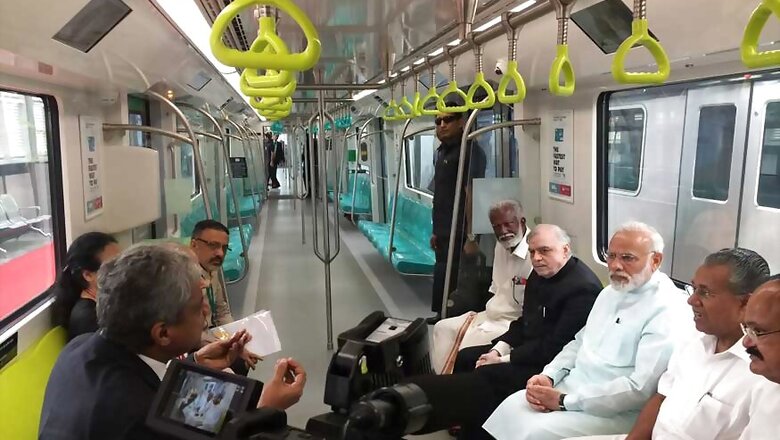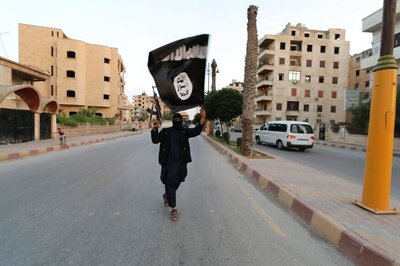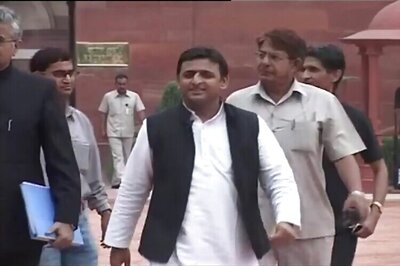
views
Kochi: Prime Minister Narendra Modi on Saturday flagged off the Kochi Metro, Kerala’s first Metro rail, and took an inaugural ride onboard the train with dignitaries, including Chief Minister Pinarayi Vijayan and ‘Metro Man’ E Sreedharan.
Governor P Sathasivam, Union Urban Development Minister M Venkaiah Naidu, Urban Development Secretary Rajiv Gouba, Kerala Chief Secretary Nalini Netto and Kerala Metro chief Elias George were also present.
PM Modi cut the ribbon of the much-awaited project at Palarivattom station and after the inaugural ride was scheduled to proceed to the JLN Stadium in Kaloor for a public event.
Kochi Metro officials said introduction of a world-class metro system in Kochi would enhance the quality of life for the Greater Kochi metro area by improving regional connectivity and reducing overcrowding, traffic congestion, transit time, air and noise pollution. They said by being the first metro system in the country with an integrated multi-model transport system, Kochi Metro will not only give the city a much required face-lift but also provide end-to-end connectivity.
A unique aspect of metro stations will be the deployment of members of Kudumbashree — the women empowerment-oriented, community-based self-help group project of the Kerala government — for managing the station operations. Kudumbashree will provide a vast array of services from customer relations, crowd management, housekeeping and catering services, which once operational, will be the largest crew of women to be employed by any city.
Besides, every Metro station has been designed on a specific theme around Kerala culture and geography. KMRL has also included the transgender community in its operations along with Kudumbashree, thus becoming the first organisation to appoint transgenders as per the state government's policy.
“We are really proud of our social initiatives. This is probably the first infrastructure project which has brought in Kudumbashree. We have employed around 1,000 women from the disadvantaged sections. They have been employed in ticketing, housekeeping, parking, gardening and customer care. We have focused on women employment in all sectors of the Metro, including technical," KMRL MD Elias George told CNN-News18 before the inauguration.
George also stressed on the eco-friendly aspects of the project. Around 25% of the energy needs will be met by solar power, he said. Besides, the pillars of the Metro line will also be converted into vertical gardens and will use recycled municipal waste.
The event was earlier mired in controversy with Sreedharan’s name left out of the guest list. Public uproar forced the state government to write to the PMO again, following which Sreedharan and Opposition leader Ramesh Chennithala were invited.
Sreedharan, the principal advisor of DMRC and the main driving force behind the Metro, said the addition will change “social attitudes”. "A lot of discipline is required while using the Metro. We have to maintain orderliness and cleanliness. It will change the social attitude of the people and bring a new living culture," he told CNN-News18.
He also recalled the challenges faced while executing the project. Primary concerns were rainfall and narrow roads, he said. “If we had taken over these roads for construction, people would have been inconvenienced. So we had to do most of the work at night. This was not the case with other cities where we carried out the work during the day. Here, more than 80% of the work was done at night."
The deliberations for the Metro first began in 1996 and plans were approved by the state government in 2008. Central permissions, however, proved a stumbling block — the state government wanted a Public-Private Partnership model but the central government had wanted a Centre-State partnership.
Finally in 2012, the Centre gave a go-ahead and then prime minister Manmohan Singh laid the foundation stone on September 13, 2012.




















Comments
0 comment